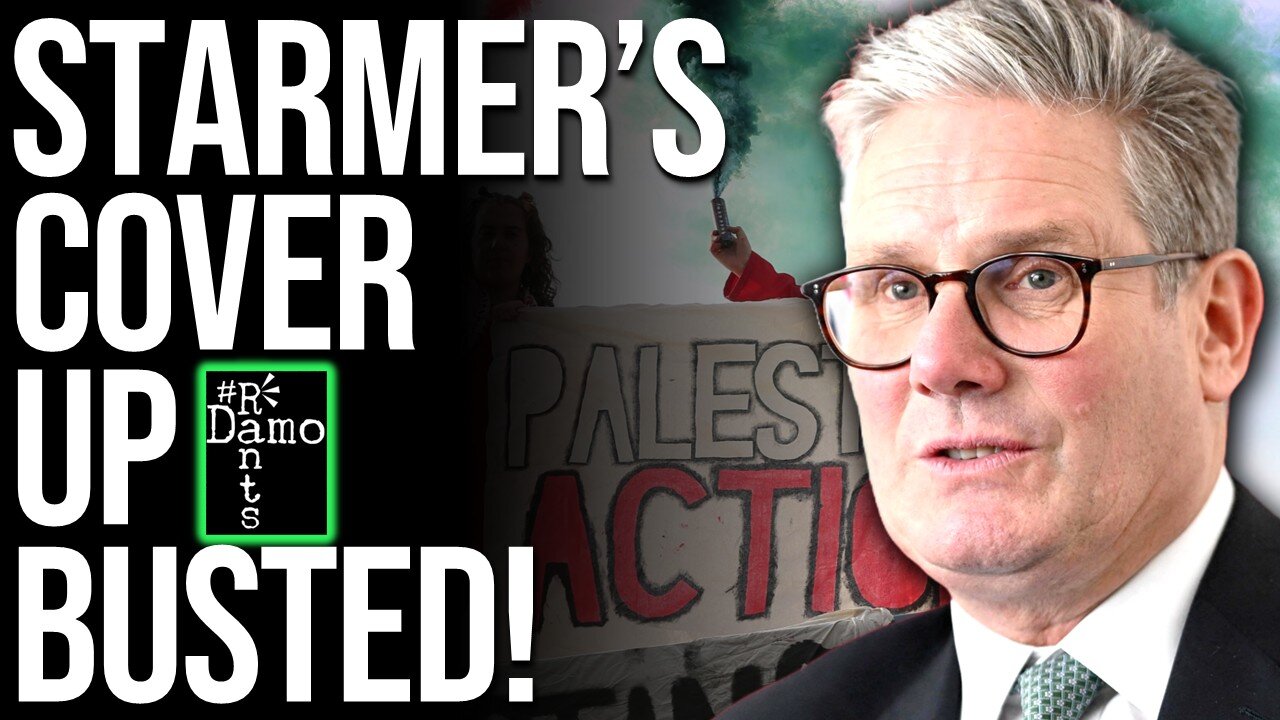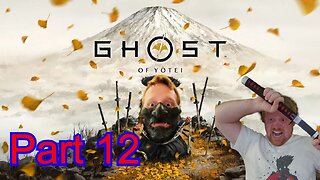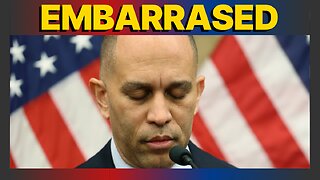Premium Only Content

New Evidence Just Destroyed Labour’s Palestine Action Case
Right, so only a government so completely drunk on power and its own rhetoric could possibly call a paint-splattered protest a terror threat and expect the country to nod along. Yet that’s the corner Keir Starmer’s administration has now painted itself into a corner over. Back in July of course, Yvette Cooper, the then Home Secretary, jumped the shark and proscribed Palestine Action under the Terrorism Act – all to prove Labour’s “toughness” on extremism. The snag that came out very shortly afterwards though, was that every official body that mattered, the Joint Terrorism Analysis Centre especially, said it did not recommend this course of action. An example had to be made of those championing Palestine by this most pro Israel of UK governments though didn’t it?
With a judicial review being heard next month, things already looked ropey for Starmer and Co, but incredibly, things have just managed to get even worse for them now.
Right, so Palestine Action. Yvette Cooper made a decision that has come to define the legal and political character of Keir Starmer’s government – protect Israel at all costs and they may end up paying a very humiliating price for that, as political and judicial due process continues to progress. Using powers under the Terrorism Act 2000, she proscribed the protest network Palestine Action as a terrorist organisation for throwing paint over a couple of hedge fund owned planes, leased back to the RAF, because capitalism says the state isn’t allowed to own anything apparently, not even our own defences. The order criminalised membership, funding and public support of course, eliciting all those scenes of pensioners and the disabled being arrested dutifully by the fuzz as threats to the UK’s very existence. Doris down the road is a terrorist now, for holding up a piece of cardboard. Cooper told Parliament that the move was required to “protect the public” and insisted that Palestine Action’s conduct “meets the threshold” for terrorism under the law.
But that claim was never supported by evidence. Palestine Action’s record was public: factory occupations, roof-top protests, paint-throwing at arms manufacturers, and blockades of transport sites. No one had ever been injured, no explosives or weapons were ever used, and the Crown Prosecution Service had never brought terrorism charges against any of its members. The group had been prosecuted for criminal damage, trespass, or public-order offences – which they had committed by their direct action - but nothing more. Under the law, terrorism requires serious violence or risk to the public and intent to intimidate the population. None of those applied. We all know it, the government felt otherwise, Zionist leanings and Israel Lobby donors surely having absolutely nothing to do with all of that.
How did a government elected to restore integrity end up branding peaceful protest as terror then?
When Cooper made her announcement, Labour had been in office still less than a year. The country was still adjusting to a government promising “professionalism” after years of Conservative crisis management. But that promise of competence quickly merged with political caution and an authoritarian streak a mile wide. Cooper’s proscription speech contained no new intelligence and no statement from the Joint Terrorism Analysis Centre, the body responsible for determining whether an organisation poses a terrorist threat. The decision was baseless, all dressed up as law enforcement.
Initially it worked. The headlines were short; the framing decisive. Yet within weeks, the story began to unwind didn’t it? Investigative reporting revealed that JTAC had reached the opposite conclusion: that most of Palestine Action’s activity amounted to “criminality, not terrorism.” It had also been described as “novel and unprecedented.” Officials warned ministers that using counter-terror powers to deal with property damage would set a dangerous precedent. Cooper went ahead anyway.
So by mid-summer, the contradictions had become a matter of record. If the statutory threshold was not met, the decision could not possibly survive judicial scrutiny, though we still wait of course for that to be tested, the review coming next month. The only explanation left for this was a political one. Inside Whitehall, it was understood that the government wanted to look firm after months of criticism over Israel’s genocide in Gaza. Palestine Action’s protests targeted Elbit Systems UK — Israel’s main arms supplier and a contractor to the Ministry of Defence. Proscribing the group conveniently aligned Labour with Israel’s security narrative and distanced it from a protest movement gaining sympathy in British streets. And this is where the story thusfar has ended for those of us who have been following it. But now there’s more.
That political gain inference has gained factual weight now that Scotland has entered the story. Documents that have just been released under Freedom of Information law by The National revealed the minutes of the May 2025 meeting of the Scottish Counter-Terrorism Board, part of the UK-wide CONTEST strategy. The minutes stated that Palestine Action’s activity “has not been close to meeting the statutory definition of terrorism.” The meeting involved senior representatives of Police Scotland, the Scottish Government, and national-security agencies. This was therefore six weeks before Cooper signed the proscription order.
So the chronology exposed here is damning. The Home Office had access to a written statement from its own counter-terror apparatus declaring that the legal threshold was not met. Ministers ignored it. That single document transforms the argument from a matter of discretion into one of illegality. In British administrative law, a minister acts unlawfully if they make a decision that no reasonable official, informed by the evidence before them, could make. The Scottish minutes and the JTAC assessment together prove precisely that.
Those facts are now before two courts. The first is of course the judicial review scheduled for late November in the High Court in London. The claimants, including Palestine Action co-founder Huda Ammori, will argue that the decision was irrational, disproportionate, and incompatible with rights to freedom of expression and assembly. Liberty and Amnesty UK have been granted permission to intervene, and the United Nations Special Rapporteur on Counter-Terrorism and Human Rights has joined the case. Few domestic proscription orders have faced scrutiny on that scale, but such has been the abuse of power here.
The government’s defence relies on a familiar doctrine: national-security discretion. Ministers will claim they had access to intelligence that cannot be disclosed and that courts should defer to their judgment. But deference is built on good faith. Once the evidence shows ministers disregarded the professional advice provided to them, the presumption of good faith collapses. Judicial restraint gives way to judicial review.
The second challenge is unfolding in Scotland itself. On 10 October, former diplomat and journalist Craig Murray filed a petition in the Court of Session in Edinburgh, arguing that enforcing the ban in Scotland breaches the Human Rights Act and the Scotland Act’s requirement that devolved authorities act compatibly with those rights. The petition names the Home Secretary, the Lord Advocate, and Police Scotland as respondents. If Scotland’s own counter-terror board has stated that Palestine Action’s conduct is not terrorism, how can its police criminalise association with the group?
No British government has faced a twin legal challenge of this kind ever. If the High Court quashes the order, the ban falls UK-wide. If it upholds it but the Scottish court rules enforcement unlawful, the UK will be left with a constitutional crisis, a legal contradiction — a proscription legal in London but unenforceable in Edinburgh.
But this short-term show of strength has metastasised into a long-term liability. Within Labour’s base, the move is viewed as betrayal — a party built on civil-rights traditions, on working class protest using terrorism law against campaigners for Palestine. Among Muslim and left-wing voters, it has reinforced a perception that this leadership prioritises foreign-policy alliances over domestic justice and that this applies to Israel more than anyone else. For civil-liberties organisations, it demonstrates that the line between public order and political repression has finally broken.
Inside government, the impact has been corrosive. Civil servants at the Home Office and JTAC, whose analyses were ignored, now watch their work weaponised for political messaging. The leaks to the press were not insubordination; they were a defence of institutional integrity and whoever leaked those meeting notes has done the country a real service. Once officials believe politics overrides evidence, the entire security architecture begins to erode.
The Terrorism Act 2000 defines terrorism as the use or threat of serious violence, or acts creating serious risk to the public, for the purpose of influencing government or intimidating the public. The law was drafted to address armed campaigns, not non-violent protest. Property damage qualifies only when it endangers life. Palestine Action’s tactics — paint, locks, and sit-ins — do not do that. The government’s claim that such acts “meet the threshold” is utterly untenable.
Legal commentators have described this as a breach of the principle of legality: the idea that fundamental rights can be limited only when Parliament has explicitly said so. Parliament has never authorised the government to classify civil disobedience as terrorism. Doing so without explicit authority subverts the law’s meaning.
This expansion of definition carries consequences far beyond one case though. If civil disobedience can be treated as terrorism, then environmental protesters, trade-union pickets, or anti-war campaigners can all be swept under the same banner. Where does the line get drawn? The line between protest and coercion would no longer be legal but political — drawn by ministers according to convenience.
Scotland has now turned that into a concrete challenge. Under the Scotland Act, devolved authorities must act compatibly with Convention rights. The Scottish Counter-Terrorism Board’s May 2025 minutes show that local officials already handled Palestine Action as a public-order issue. Once Westminster imposed the proscription, Police Scotland had to reclassify protest as criminal association. Murray’s petition argues that this contradicts both human-rights obligations and the principles of devolution.
It also raises a question about sovereignty. If the UK government can force Scottish authorities to treat non-terror activity as terrorism, what remains of Scotland’s ability to meet its own legal obligations? The case is therefore not just about one protest network; it is about whether devolution protects rights when national security gets invoked.
The involvement of Liberty, Amnesty, and the United Nations gives the dispute an international frame. Their submissions emphasise that Articles 10 and 11 of the European Convention on Human Rights guarantee expression and assembly. Restrictions must be necessary and proportionate. To justify proscription, the government must show a real threat to life or safety. No such evidence exists. The ban very much appears to serve a political, not protective, purpose doesn’t it?
The UN Special Rapporteur has repeatedly warned against the misuse of counter-terror law to silence activism concerning Israel and Palestine. For the UK, a country that long styled itself as a guardian of the rule of law, to appear in this context as the violator marks a massive reputational fall.
Responsibility for this chain of events is clear though. Cooper initiated the ban. Shabana Mahmood, succeeding her at the Home Office, has upheld it despite mounting contradictions. Starmer endorsed it, the former Director of Public Prosecutions no less, so the fall for him if the High Court strike this down will be the furthest.
None of the three have acknowledged that their own security services disputed the justification. Each is now tied to a decision that may be struck down by the courts.
If the High Court finds the order irrational, the precedent will be historic. It would mark the first successful judicial quashing of a terrorism proscription on those grounds. It would also limit ministerial discretion for future cases, forcing transparency before bans are imposed. Even if the government survives this – and they sure as hell don’t deserve to, this could be Starmer’s Poll Tax moment - the exposure of internal dissent has already damaged its credibility.
For Labour, the moral cost is severe. The party that promised integrity has been caught manipulating the law it claimed to defend. That contradiction corrodes trust not only among activists but within the institutions expected to enforce its policies and for a party that is record-breakingly unpopular in the country already, led by the least popular Prime Minister in British history, we could be in uncharted territory as to where things lead to.
This episode belongs to a longer trajectory though, one that has defined Starmer’s premiership certainly: the convergence of national security and domestic control, though much of the setup predates him. The Prevent programme, the 2023 Public Order Act, and the policing of climate-action movements have all stretched the definition of threat. The proscription of Palestine Action has pushed it to its limit. It demonstrates how easily anti-terror law can mutate into an instrument of political discipline.
International parallels confirm the trend. In France, environmental campaigners have been described as “eco-terrorists.” In the United States, pipeline protesters faced domestic-terror charges. Britain’s decision sits within that framing — democratic states invoking security to manage dissent. The danger is not that they will abolish protest overnight, but that they will render it legally meaningless and permissible only when ineffective.
Every security measure protects someone’s interest. In this case, the beneficiaries are blatantly obvious. Palestine Action’s primary target was Elbit Systems UK, supplier of drone components to Israel and contractor to the Ministry of Defence. By treating opposition to that company as terrorism, the government effectively transformed corporate protection into counter-terror policy. The relationship between defence industry and government is no secret. The symbolism is in the legal form: a protest against war manufacture reframed as a threat to the nation.
Britain’s history of protest is a history of overreaction. Suffragettes were imprisoned for property damage; miners were treated as public enemies; anti-apartheid activists were denounced as subversives. The pattern is consistent: governments criminalise movements they later celebrate. The proscription of Palestine Action follows that pattern, with one escalation — the use of terrorism law. Earlier crackdowns invoked public order; this one invokes national security. That shift marks a new stage in the evolution of repression: quieter, procedural, and clothed in legality.
As the judicial reviews approach, the government’s position looks unsustainable now. The evidence against it is documentary, not speculative. JTAC’s findings, the Scottish minutes, and the parliamentary record all contradict the ministerial narrative. Judges cannot ignore a paper trail that shows advice rejected and definitions distorted.
Even if ministers win on technical grounds, the political verdict is fixed. The story is simple and fatal to credibility: a government used terrorism powers against a protest group after its own experts said the group was not terrorist. No ruling can erase that sequence.
If ministers can redefine terrorism once to criminalise protest, they can do it again — against any movement that threatens their interests. This is the larger stake. The Palestine Action case is not an anomaly; it is a warning about how easily democratic governments can transform protective law into punitive law. The precedent, if left unchallenged, would invite every future Home Secretary to conflate dissent with danger.
The question extends beyond party politics. It concerns the kind of state Britain is becoming: one that invokes legality while hollowing it out from within, one that treats protest as pathology, and one that calls security what previous generations called control.
The proscription of Palestine Action began as a gesture of authority and has ended as evidence of weakness. Every body involved — JTAC, the Scottish Counter-Terrorism Board, and now the courts — has exposed its contradictions. What remains is a government that mistook appearance for integrity and now faces judgment for it.
The hearings in London and Edinburgh will decide the legal future of the order, but the moral verdict is already in and has been for some time. A government that criminalises protest while defying its own experts has forfeited any claim to legality.
The only question now is how much longer it can pretend the law is still on its side.
The authoritarian streak is now being extended to our Universities and once again Israel is at the heart of it as Starmer has handed £1m to a Zionist organisation, in order to deliver antisemitism training on campuses across the country. That’s blowing up in the governments face too, who exactly do this lot serve? It hardly seems to be the people who voted for them does it? Check out all the details of that story in this video recommendation here as your suggested next watch.
Please do also hit like, share and subscribe if you haven’t done so already so as to ensure you don’t miss out on all new daily content as well as spreading the word and helping to support the channel at the same time which is very much appreciated, holding power to account for ordinary working class people and I will hopefully catch you on the next vid. Cheers folks.
-
 30:07
30:07
JohnXSantos
1 day agoWhy Clothing Brands NEVER Fail- Master Class
8 -
 LIVE
LIVE
Spartan
1 hour agoOMiT Spartan | God of War Ragnarok, College Halo match @ 9:30 EST, then ranked or more GoW:R
5 watching -
 LIVE
LIVE
John_Goetz
49 minutes agoJohn Gets Gaming - Ghost of Yotei
15 watching -
![[LIVE] Battlefield 6 | Full Focus, Cinematic Moments, Zero Fear 😎](https://1a-1791.com/video/fwe2/cb/s8/1/q/z/W/r/qzWrz.Vkob-small-LIVE-Battlefield-6-Full-Foc.jpg) LIVE
LIVE
AgnoLand
1 hour ago[LIVE] Battlefield 6 | Full Focus, Cinematic Moments, Zero Fear 😎
192 watching -
 24:34
24:34
HaileyJulia
8 days agoThis Christian Morning Routine Changed Everything for Me
301 -
 35:04
35:04
Athlete & Artist Show
8 hours agoOlympic Hockey Is In Trouble!
130 -
 23:07
23:07
DeVory Darkins
5 hours ago $49.09 earnedDemocrats EMBARRASSED after No Kings Protest officially FLOPS
81.8K128 -
 2:45:26
2:45:26
Barry Cunningham
5 hours agoV.P.J.D. VANCE AND SEC OF WAR PETE HEGSETH GIVE REMARKS AT U.S. MARINES 250TH ANNIVERSARY
109K14 -
 LIVE
LIVE
Tundra Tactical
6 hours ago $12.96 earned🛑{LIVE NOW!!} The Great Tundra Nation Gun Show!!!! Presented By MGS Trade School
621 watching -
 4:35:07
4:35:07
Right Side Broadcasting Network
4 days agoLIVE: VP Vance Attends the U.S. Marine Corps 250th Anniversary Celebration - 10/18/25
62.8K41